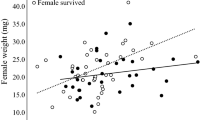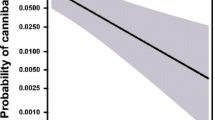Abstract
We compared the occurrence of filial cannibalism in fed and starved male fantail darters (Etheostoma flabellare). All males in the experiment consumed eggs, and 56% ate all of their eggs. A male's initial body condition did not explain the number of eggs that he ate. Neither did non-fed males eat more eggs than fed males. Fed males were able to maintain better body condition during the experiment, but the change in body condition also depended on the number of eggs eaten. Thus, males who ate more eggs were able to maintain better body condition.The most important determinant of whether or not a male ate all of his eggs was his initial egg number. Males with small egg masses ate all of their eggs whereas males with large egg masses were only partial cannibals. There was, however, no difference in the total number of eggs eaten by total and partial cannibals. We conclude that eggs are only partially eaten for energetic reasons. We also suggest that small egg masses are completely consumed because the costs of caring for a small egg mass may exceed the expected reproductive benefits of a small egg mass.
Similar content being viewed by others

Author information
Authors and Affiliations
Additional information
Received: 26 January 1996 / Accepted after revision: 2 November 1996
Rights and permissions
About this article
Cite this article
Lindström, K., Sargent, R. Food access, brood size and filial cannibalism in the fantail darter, Etheostoma flabellare . Behav Ecol Sociobiol 40, 107–110 (1997). https://doi.org/10.1007/s002650050322
Issue Date:
DOI: https://doi.org/10.1007/s002650050322



